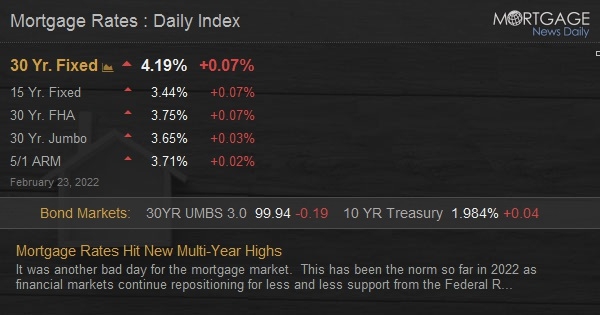The over 70-year peace in Europe has been interrupted by Russia’s invasion of Ukraine. That’s got people talking here in the US. We’ve all seen the headlines, and it’s a bit unsettling.
War’s effect on your real estate – The Short Answer?
Recently we have seen the volatility in the stock market, and the Federal Reserve will take a step in March that will cause interest rates for borrowing to rise in all sectors, including mortgage lending. We are also in a period of hyperinflation which is why the Fed is making adjustments to the US monetary policy. High inflation, higher lending rates, and a volatile stock market all make for an uncertain economy where your hard-earned dollars don’t go as far.
Russia’s military invasion of Ukraine will cause global markets to see a sell-off of stocks for investors to protect their money looking at an uncertain future. Will Russia be sanctioned, will Russia move through Ukraine to go after Poland? Will the sanctions imposed on Russia halt the production of goods in other countries? It’s all up in the air.
The short answer is the housing market is strong, and mortgage interest rates are still historically low. Inventory of homes for sale is still historically low, and that keeps home prices strong; low supply, high demand will insulate home prices into spring. But it won’t be like last spring and summer. Hyperinflation and higher cost of day-to-day items coupled with higher interest rates will cut into the buying power of borrowers, and that means sellers likely won’t see the windfall of offers and profits this year.
To make sense of it, we break down the factors below, but if you don’t want to read on, let’s just say that anytime is a good time to invest in real estate, and we can help you make a plan. Just reach out to us; we know how to plan in an uncertain market:
(406) 426-1735 Montana Direct
(503) 729-9735 Oregon Direct
michaelj@myreateam.com
How do wars really affect the real estate market?
It is a complicated question, but let’s try to break it down a little. There are a few variables that affect the housing market; the mortgage lending market, the cost of living, and the stock market. All of these markets are affected by several factors. Real estate is affected by the hopes and fears of investors in all areas of our day-to-day life.
Mortgage Rates
Mortgage rates are influenced by the stock market and the governing US Federal Reserve policies. In short, it’s complicated. The interest rates that lenders charge borrowers are based on investments in the stock market and what interest Federal Reserve member banks have to charge corporate investment borrowers. There are federal bonds that are made up of mortgages; they are called “Mortgage-Backed Securities.”
If the stock market is hot, and the investors are investing in American and global stocks, investors shy away from mortgage-backed securities because they typically have a very low return. But if the stock market is down, and people are conservative, the mortgage-backed securities increase in value. When the mortgage-backed securities increase in value, in order to pay investors that return, the interest rate on borrowers goes up.

Cost of Living
The cost of living is defined as the amount of money needed to sustain a certain standard of living by affording basic needs such as housing, food, healthcare, and more.
World Population Review, Author unknown.
As the cost of living goes up, people have less money to invest. The cost of goods and services increasing is called inflation. It is easy to understand that when it’s harder to put gas in the car or milk in the glass, people are going to have less money for a downpayment on a home, and less money to pay a monthly mortgage payment. Lower cost of living means people will have extra money for recreation, buying of goods and services, and investing.
Today’s reality is that we are living with an inflation rate of 7.5%. A simple way to see this is that the groceries you purchased a year ago now cost 7.5% more than the same time last year. It is a year-over-year combined comparison of items tracked in the Consumer Price Index.
The Consumer Price Index is defined by the US Bureau of Labor and Statistics as…
“a measure of the average change over time in the prices paid by urban consumers for a market basket of consumer goods and services.”
U.S. Buerau of Labor and Statics Website
Inflation also causes the real estate market to correct both up and down. If buyers have money to spend, the price of homes goes up as sellers see the opportunity for competition between buyers for a home. If buyers have less spending money, the price of homes can come down as sellers entice buyers with lower prices.

The Stock Market’s Influence
We can almost repeat what was said above about the cost of living related to the stock market’s influence on the housing market. If investors are making profits in the stock market, they pull their money out of mortgage-backed securities. Also, profits in an investor’s pocket give more cash to spend on other investments like real estate.
A losing stock market causes investors to seek the safety of real estate and they invest in mortgage-backed securities. This drives lending interest rates to go up, and borrowers are charged more for their loans. This gives buyers less money to put toward their principal amount and thus they qualify for a lower loan amount.
The people at UpNest have a good explanation for this if you want more info. Again, to keep it simple, if stocks are paying dividends and going up in price, that is good for the real estate market.
The Bottom Line
Due to the war, investors are pulling out of all of the stock market exchanges across the globe. The reason is that sanctions imposed against Russia by other countries will affect the global production of goods at all levels and in all countries. This is will affect supply and demand.
Hyperinflation in the US, decreasing profits in the stock market, and rising mortgage interest rates are going to hit buyers in the wallet. Sellers will have to consider their pricing strategies as we move toward spring. The time of over-asking offers and multiple-offer situations are coming to an end for sellers.
If you want a valuation on your home, we are here to help. Just reach out here and we can have that discussion. And if you want to see what the value of your area is like, check out our Market Evaluation tool.
If you are looking at buying right now, and are a bit discouraged, we get it. But interest rates are still at a 30-year low, and you can get a deal on whatever you can qualify for. Home prices will probably be increasing a bit coming into summer, but buyers are in a great position to find that right place to see their homeownership dream come true. Drop us a line, or give us a call.
Michael Jester
Licensed REALTOR® in Montana and Oregon
MT License: RRE-RBS-REN-94415
OR License: 201229193
US Air Force Veteran | SRES® | Certified Relocation Specialist | Certified REO Specialist | iBuyer/Express Offers Certified | Certified Real Estate Mentor
My Real Estate Advisor Team Brokered by eXp Realty, LLC
(406) 426-1735 Montana Direct
(503) 729-9735 Oregon Direct
michaelj@myreateam.com





